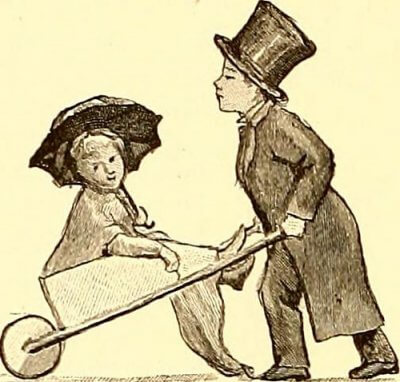Generous Person, or Over-Giver? Always Gift-Giving?
by Andrea M. Darcy
Being a generous person is one thing. But what about when we give too much or our time and energy? Or are always indulging in, say, excessive gift-giving?
Generous person or over-giver?
It is really a question of our intent when it comes to giving.
Real giving is done from a place of true generosity and because we have an excess of something to offer (time, support, energy). It tends to be an impulse we don’t have to overthink. And the giving leaves us feeling good and energised.
Over-giving tends to come not from generosity, but from hidden need.It is an energetic transaction where we expect a return, even if that is just praise, appreciation, or to stop feeling guilty. And when we give too much, we feel depleted, not energised. We might even feel annoyed at ourselves or with the other person.
The psychology of excessive gift giving
So when we over-give, we are generally giving because we are:
- hoping for a return on what we give
- wanting to be appreciated or loved
- needing feel good about ourselves
- wanting to be seen as the stronger/smarter/wiser/ person
- think nobody else is capable so we ‘have’ to do something
- believe if we do something it will ease a feeling of guilt.
The cost of over-giving

By: Selma Broeder
When we over-give, we give because we think we ‘should’ or ‘have to’.
So essentially we go against ourselves and trample our own personal boundaries. Particularly if we give energy and time we don’t really have, this can result in in feeling upset with ourselves. Which in turn lowers self-esteem. No wonder, when we put our own needs last.
When our self-esteem is always being bashed, and we lose sight of our needs? The end result, over time, can be depression, anxiety, low self-esteem, and repressed anger.
Over-giving and codependency
Over-giving is often a sign of codependency. When we are codependent we take our sense of self from pleasing others. So we give too much in order to receive praise and attention that then gives us a feeling of esteem. But it’s ungrounded esteem, that does not come from within but from without.
Codependency can mean we are so wrapped up in being what others want we lose any sense of real identity. Again, this leads to depression and even an identity crisis down the road.
Another hidden cost of over-giving is actually loneliness. Over-giving is not a healthy transaction, and it doesn’t lead to healthy relationships. It often involves the sort of ‘friendships‘ and ‘relationships’ where a part of you starts to secretly resent the other person, and what kind of relationship is that?
The cost for others when we over-give

By: corrine brown
Often, when we over-give, we are not even actually benefiting others.
For example, if we over-give because we want others to see that we are smarter and stronger?
We can stop someone from attempting something that could have led to their personal development.
Always doing things for someone also means they have less chance to do things for themselves. Even if it’s just excessive gift-giving, especially with our children, it can mean someone doesn’t try to work and save their own money for what they want. Spoiled children often end up lazy and entitled because of this dynamic.
In fact codependency, the extreme of over-giving, can be seen as a form of control. When we do things for someone without really asking, we are essentially dictating what they have the choice to then do or not do.
An example of a generous vs over-giving

By: alan
Let’s look at a basic example illustrating the difference between giving and over giving.
Generous Person
It’s time for your break at work. You notice that a younger colleague seems upset about something. So you offer to take them for a coffee, and give them your time, energy and advice as they share a difficulty they have had with a project. Feeling good after that you’ve been of aid, you decide to respect their privacy and tell no one.
Over-Giver
You are really pressed to finish a report for end of day. But you notice a colleague is moody. You worry you are somehow responsible they are moody, perhaps your stress is affecting them? So you ask if they want to grab a quick coffee, even when you don’t really have the time and actually don’t like them that much. But as you sit there listening to them rant, you think, well I am giving them my time and advice. At least they will owe me one in the future and have to be nice to me, and my boss will be impressed at my generosity (I will make sure she finds out about it).
So what to do next?
Read our related articles, “How to Stop Over-Giving “, “How to Say No“, and “The Importance of Boundaries“.
So used to giving away all your energy and time you can’t seem to stop? Aware that your self-esteem is dangerously low? It might be time to receive some support in the form of counselling or psychotherapy. A professional therapist can help you recognise how you learned this pattern of behaving, and support you in trying new ways of being that mean you are finally in control of your time and energy.
Harley Therapy connects you with warm, professional therapists in central London locations who can help you stop over-giving and improve your relationships. Not in London? Our new platform connects you with therapists across the UK who you can work with over Skype.
 Andrea M. Darcy had to learn the difference between generous person and over giver and overcome her need to people please! A popular mental health writer, she also runs a therapy consultancy, helping people save time and money by quickly finding the right therapist and therapy for them. Find her @am_darcy
Andrea M. Darcy had to learn the difference between generous person and over giver and overcome her need to people please! A popular mental health writer, she also runs a therapy consultancy, helping people save time and money by quickly finding the right therapist and therapy for them. Find her @am_darcy






I enjoyed your articles,please send me more information abt false guilt,irrational fear,and codependency and over generacity
Hi Seshu, we have articles on all of those topics, simply use the search bar to find them. Thanks.
Great article! Thank you for writing it.
Glad it was helpful!
send me more of your message, i think i am affected and need correction
Sorry to hear you feel you are not setting good boundaries with others. We hope the article helped. If you click through on links in the article it will take you to other useful articles too. Good luck!
This is honestly a serious issue for me. I have only read about this over -giving personality today. I don’t know where it started, I just know it needs to end. I ruin all my relationships with literally all this.
Hi Kayl, sounds like a lightbulb moment!
Is it over giving if i feel that i give my all to my family because I am obliged and wait for them to at least remember me also if they also have something to share. Sometimes I wish they lessen my burden, but i dont think they notice my difficulties. How come they can save for themselves while I give my all? I was left nothing.
Hi Leya, if we are giving expecting a return an because we feel obliged over want to, then yes, we are over giving, and it’s more of a psychological issue than true giving, the article gets into this. Best, HT
Why do I always think of others before myself. If I see something someone needs try and get it for them or I say I may tell them i may be able to either help or get it for them. But sometimes it doesn’t work out the way I wanted it to…I promise things at the time to do or get and it disentangle work out…why do I do that, it droves me insane…
Hi Rhonda, as the article discusses, it’s often related to low self-esteem and codependency. You might want to read our other article on how to stop overgiving. https://www.harleytherapy.co.uk/counselling/giving-too-much-in-a-relationship.htm Best, HT.
This is plaguing me and my relationship is suffering for it. This article males perfect sense and I need some resources to help combat these fixations. I think i may have learned it from my.mom and guilt is so heavy. Please help.
Hi Sarah, we’d suggest you research codependency, which refers to taking our identity from pleasing others. there are a ton of great books about working through codependency, such as the classic, ‘Codependent No More’ by Melody Beattie. It contains worksheets and tips. And, yes, daughters often learn it from mothers. Finally, we don’t know your age, if you are 18+ consider counselling, codependency is a hard pattern to crack alone. Best, HT.
I feel like, I like being thoughtful and generous. It makes me feel good doing nice things for others (coworkers and significant other), but I sometimes feel as though I’m not getting anything at all in return besides a smile and a thank you. While I don’t expect more than that in return all the time. Only sometimes, I just wish they would be thoughtful and giving back. Is that a form of selfishness? Or is it me being over-generous? I know it devalues the generous gesture by expecting something in return, but I can’t help but think I’m doing too much and not getting anything at all in return. If that makes any sense. Maybe I’m just overthinking.
Best example is, it’s Christmas time at work. Every year I give a goodie bag of treats to my co-workers. I spend my time and money putting them together. I rarely get anything in return because of this. I know it’s more about giving than receiving that time of year, but I just wish I’d get a little something back in return. Even if it’s a card or a piece of candy. Is it selfish to think and wish that? Should I just stop doing the gesture? At what point is it being generous to being a doormat?
Hi Jennifer, we’d say it’s well worth being very honest about your intentions for all this well thought out giving. And then ask good questions. How would it feel to just stop it all? What might that tell you about your intentions? Would you still feel valuable and worth being friends with if you stopped giving those gifts? If we are giving as it helps us feel better about ourselves, then it’s often veering into unhealthy giving and it might be time to step back, take a break, and start giving again when it just feels natural and fun, not as you ‘should’ give to be some idea of a ‘good person’ you have decided on. Best, HT.
Thank you!! How do I combat my self-imposed expectation to give glamorous, savings-draining gifts at Mother’s Day / Holidays, etc ? I give these gifts to my Mom and aunts – whose struggles in younger years (on my behalf) warrant the giving of extravagant gifts.
Hi Amanda, sounds to us like you need to take the focus off the gifts, which is the easy thing to focus on, and focus on the real issue here. So ask questions like, what do I need to admit to myself about this guilt I feel? How can I come to terms with all my guilt? Is this really my guilt to feel? Is this guilt even just about the struggles of others on my behalf, or is there more going on here? Is it really just guilt? Are there other feelings? Sadness, anger? In summary, we don’t think this is a little issue, we suspect there is far more at work here, and if there is a much bigger picture driving your endless sense of guilt and suffering then we’d suggest you don’t overlook the power of some counselling sessions to work through it. Best, HT.
Thank you, I saw this trait in someone else and it didn’t sit right and has been bugging me. The article confirms and clarifies this type of behavior
Hi Miza, we hope you can have an open, non judgemental talk with this person if their behaviour isn’t sitting right, over making any assumptions. People and relating are tricky, the best tool is always communication over guessing what someone is thinking or behaving. Best, HT.
Read your…This is my lifestyle…I give my all without any savings…I’m always available to solve people’s issues without considering myself…I need to stop cos most times i get mad at me and at the other person….How do i control it…Thankd
Hi there Amina, this sort of pattern is usually deeply ingrained and comes from childhood. At some point along the way you likely learned you have to earn other people’s attention and love, that you weren’t worthy of just accepting it. So this sort of pattern doesn’t disappear overnight, it’s part of a self healing journey. There are many many self help books out there on things like codependency and self-esteem, relating, etc, that can start to slowly help you gain enough confidence you don’t have to fall into pleasing. But if you can access any sort of therapy or counselling it can really help and things can change faster. In summary, this s a symptom, to change things you have to get to the root and change that. Best, HT.